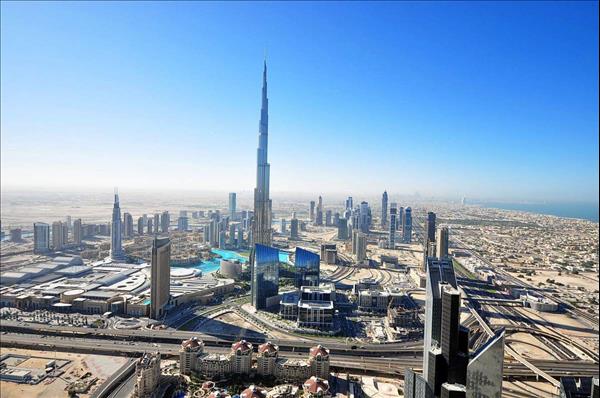
IMF Economic Outlook: UAE growth right on track
In its Regional Economic Outlook, the IMF projected GCC economic growth at just 0.5 per cent this year, the lowest since the 0.3 per cent growth recorded in 2009 in the wake of the global financial crisis. "Preparing their economies to the post-oil era is something that is becoming a priority for authorities all over the GCC and it is the right time for them to accelerate their diversification outside oil and to promote a greater role for the private sector to lead growth and create additional jobs," said Jihad Azour, director of the Middle East and Central Asia at the IMF.
"Oil exporters should continue pursuing deficit-reduction plans to maintain fiscal sustainability, and where relevant, to support exchange rate pegs," the IMF said.The Washington-based fund has projected a 1.3 per cent growth in UAE's real GDP in 2017, which it expects to surge to 3.4 per cent in 2018. While consumer price inflation in the UAE will edge up slightly from 2.1 per cent in 2017 to 2.9 per cent in 2018, the Emirates will record current account balance at 2.1 per cent this year and next, the IMF said.
Sultan bin Saeed Al Mansouri, the UAE Minister of Economy, said on Monday that the outlook for the economy is brightening despite regional and global macroeconomic challenges. "With two years into Dubai World Expo 2020, the economic growth momentum is expected to pick up on the back of a vibrant non-oil sector as the country remains on track to establish a diverse knowledge- and innovation-driven economy," Al Mansouri said.The IMF official said while Saudi Arabia's real GDP growth is forecast to be flat at 0.1 per cent, down from 1.7 per cent last year, it would post a marginal improvement in 2018, driven by non-oil sector growth. The GCC growth projections are mainly driven by the oil producers' deal to cut output to bolster low crude prices, said Azour.
He said the introduction of the five per cent value-added tax (VAT) was one of the reform measures that would allow the GCC countries to diversify their revenues away from oil. While the low rate of VAT will have a limited impact on price rise and inflation, the tax reform is estimated to generate between 1.5 and two per cent of gross domestic product annually."We are seeing governments developing diversification strategies and introducing a certain number of reforms to allow the economy to be prepared for the post-oil era," said Azour, stressing that countries should seize the global upswing to implement needed structural reforms. "Improving the business environment, increasing access to credit and modernising labour markets will help boost growth and create private sector jobs. This will be critical with millions of new job seekers expected over the coming years."
While the economies of oil exporters in the Middle East and North Africa - also including Iran, Iraq, Algeria, Libya and Yemen - will grow 1.7 per cent, down from 5.6 per cent the previous year, oil importers in the region are expected to expand GDP by 4.3 per cent this year, up from 3.6 per cent in 2016, the IMF said.In the Middle East, North Africa, Afghanistan, Pakistan (Menap) region, oil-exporters, non-oil growth is expected to recover to about 2.6 per cent in 2017 as fiscal consolidation generally slows. However, the agreed reduction in oil output under the extended Opec-led agreement means overall growth will bottom out at 1.7 per cent in 2017.
Arif Amiri, chief executive officer of DIFC Authority, said the IMF report highlights the growing need for structural reform in the region, which reaffirms the importance of quickly adapting to an innovative financial future. "On the subject of change and adaptation, the region is undergoing tremendous transformations and is poised to shape the future of finance and financial innovation. The combination of technology, innovation and smart policy making must be embraced by the financial sector across emerging and developing economies. By providing an established platform for firms to tap into transformational opportunities throughout the region, the DIFC is ever more committed to the advancement of the region's financial infrastructure."The IMF said as the region's oil producers brace for continued pressure from lower oil prices, the cumulative budget deficits of the Middle East would surge to $320 billion over the next five years. Approximately half of that amount - or $160 billion - will be sustained by the GCC between 2018 and 2022.
According to analysts, the projection is significantly lower than the shortfall of $350 billion that Saudi Arabia, the UAE, Qatar, Kuwait, Oman and Bahrain racked up since 2015, when oil prices plunged to their lowest in years.The IMF also surged Mideast oil importers and exporters to reduce spending and find new sources of revenue by introducing new taxes and lifting subsidies. The Fund has endorsed an ambitious Saudi Arabian plan to build a $500-billion business and industrial zone, known as NEOM, extending into Jordan and Egypt, saying the project could benefit the whole region.
-
Issac John Associate Business Editor of Khaleej Times, is a well-connected Indian journalist and an economic and financial commentator. He has been in the UAE's mainstream journalism for 35 years, including 23 years with Khaleej Times. A post-graduate in English and graduate in economics, he has won over two dozen awards. Acclaimed for his authentic and insightful analysis of global and regional businesses and economic trends, he is respected for his astute understanding of the local business scene.

Legal Disclaimer:
MENAFN provides the
information “as is” without warranty of any kind. We do not accept
any responsibility or liability for the accuracy, content, images,
videos, licenses, completeness, legality, or reliability of the information
contained in this article. If you have any complaints or copyright
issues related to this article, kindly contact the provider above.


















Comments
No comment